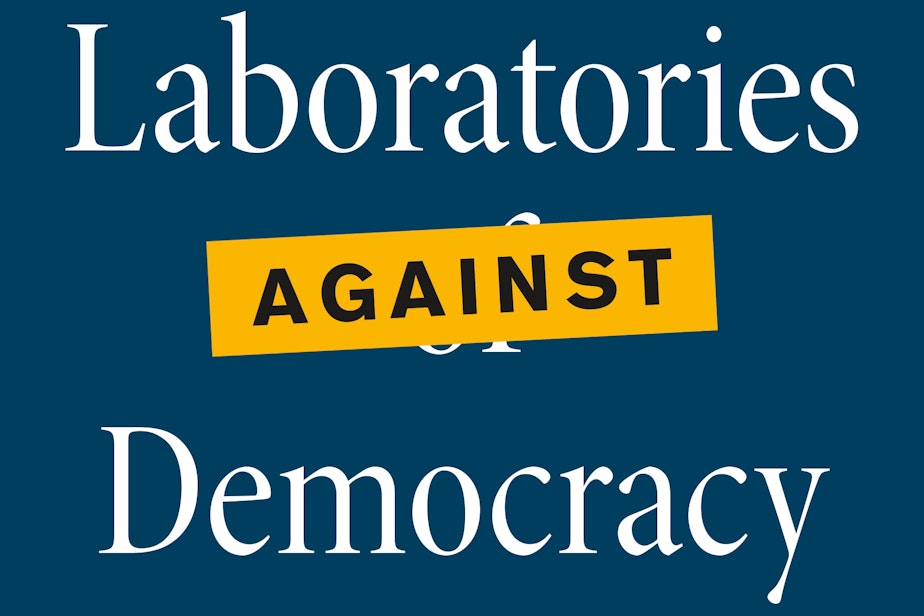Which side are you on? How democracy suffers from political tribalism

There are just two weeks to go until the midterm elections, and a recent national poll by the Associated Press found that only 9% of U.S. adults believe democracy is working “very well,” while 52% say it is definitely not working well. And how strongly we feel about that may depend on how we align ourselves with whoever is in power at the moment.
Jake Grumbach is an associate professor of political science at the University of Washington, and the author of “Laboratories against Democracy: How National Parties Transformed State Politics.” He spoke to KUOW’s Kim Malcolm about recent political trends.
This interview has been edited for clarity.
Kim Malcolm: This poll indicates that there are more self-identified Republicans now likely to say democracy isn't working well, compared to Democrats. That's a reversal from a couple of years ago. How do you make sense of those results?
Jake Grumbach: The first thing is, in an objective sense, American democracy really is under strain these days. One unfortunate thing about voters is that we often say we really have deep beliefs and support for a fair and equitable democracy, but when it comes down to it, we tend to think democracy and politics are going better, and the system works better, when our side is in power.
Based on your research, what can you tell us about how healthy American democracy is right now?
I'm a statistical, quantitative researcher. In my book, as well as my papers, I focus on democracy. In the U.S. democracy is really regulated by state governments. That's pretty unique. States, and by extension counties, administer elections, draw legislative districts, certify vote counts, and decide who comes into power, whether it's at the presidential level or at the local level.
Sponsored
We're seeing some states like Washington have really done a good job expanding democracies. Other states have really experienced some democratic backsliding over the past couple of decades: restricting access to voting, drawing more unfair district maps that favor one party over the other, and more recently there's been this increased new acute threat of what's called electoral subversion: the idea that in the 2024 presidential election, states and counties may try to pick a president that does not win the vote in their state.
One of the storylines of this election has been that there are a number of election deniers who are now running for office, who could perhaps be in charge of elections. What kind of impact are you seeing there? And how do you think that could play out?
One threat in the U.S. system is that in many states and counties, partisan actors control vote counting and other forms of election administration and certification, rather than independent bodies. That's a weakness. And more so, on the Republican side, we've seen increasing pressure in primary elections that has weeded out some of the really courageous Republican officials in 2020 who did want to certify the presidential election for the rightful winner of that election.
Ironically, in that poll you mentioned earlier, where many Republicans feel like American democracy is in a dangerously weak state, that’s because they believe this “Stop the Steal” myth, and that conspiracy is really increasing threats to American democracy. That candidates who lose office refuse to concede the election, that's a really crucial threat.
If just over half of Americans right now are expressing a lot of worry that democracy is not working very well, how hopeful are you at this point, long term?
Sponsored
I would say the problems in American democracy are not as severe as those leading up to the Civil War, or in the Jim Crow era which had mass disenfranchisement, or the long history before the 19th Amendment allowed all women to vote in the U.S. Right now, we're not in that deep of a hole, compared to the past. but the signs are extremely troubling. One unique danger is the national scope of threats to democracy. This is going to be a long-term struggle.
I think there are some signs of revitalization and hope. It's still a small number, but many individuals are now more engaged in thinking about democracy, and how to change the rules of the game, and protect the rules of democracy to keep them fair for all rather than just pursuing the rules that would make your party win. So, I think there's some hope, but we're in quite a troubling time.
Listen to the interview by clicking the play button above.





